Backroads and Ballplayers #67
Stories of the famous and not-so-famous men and women from a time when baseball was "Arkansas' Game." Backroads and Ballplayers Weekly is always free and short enough to finish in one cup of coffee.
Hot Springs Baseball Weekend, The Bellyache Heard ‘Round the World, and “Celebrating with Old Folks”\
This week’s Backroads and Ballplayers Weekly features the Seventh Annual Hot Springs Baseball Weekend and lost stories about two colorful major league stars who, like many young men born in the Great Depression, were ill equiped to handle the night life associated with big cities. They had money in their pockets and time on their hands and no experience with either!
Seventh Annual Hot Springs Baseball Weekend August 23 & 24
Hall of Famers Johnny Bench, Robin Yount, Goose Gossage, and Ted Simmons headline the seventh annual celebration of baseball in the city where spring training was born. Bench and Yount are making their first appearance at Hot Springs Baseball Weekend.
The two first-time guests will be joined by two Hall of Famers who have become Arkansas favorites. Cardinals’ legend Ted Simmons and legendary reliever Goose Gossage are well known at HSBW for their candid and humorous recollections of their years in major league baseball.
Arkansas Razorback great Tom Pagnozzi will add an Arkansas Sports Hall of Famer to the guest list on Saturday. Pagnozzi will speak about his years as a catcher for the St. Louis Cardinals. Welcome home Pags.
The activities kick off on Friday evening with a presentation by Cardinals broadcaster and St. Louis Hall of Famer Al Hrabosky. Hrabosky has become a regular at the annual event, and his inside stories are a favorite with attendees. (See schedule below)
Come early and enjoy a special showing of the recently-released documentary about everyone’s favorite storyteller, Hall of Fame catcher Yogi Berra. The free screening of It Ain’t Over will be shown Friday evening August 23. (See schedule below)
Saturday’s busy schedule will begin at 8:30 a.m. with a meeting of the Robinson-Kell Chapter of the Society for American Baseball Research. Robinson-Kell is the Arkansas chapter of SABR and guests are always welcome. This special meeting will feature author Frank Amoroso, whose new book Diamond Fever, tells about Babe Ruth’s barnstorming tour of Cuba in 1920. Amoroso will sign copies of his books in the lobby after the meeting.
Christmas for Dad - Many of you have purchased my books Backroads and Ballplayers and Hard Times and Hardball. Both books feature stories of the men and women from a time when baseball was Arkansas’ Game.
I will offer both titles at an HSBW special price only this weekend. I will also sell one of each for a special price to those of you who purchase one of Frank Amoroso’s books. Look for Frank and me in the lobby.
Seventh Annual Hot Springs Baseball Weekend
Hot Springs Convention Center August 23 & 24
Complete Schedule
FRIDAY, AUGUST 23 -At Hot Springs Convention Center
6:30 p.m. – 7:30 p.m. Cardinal Legend Al “The Mad Hungarian” Hrabosky tells his baseball story.
7:30 p.m. – 9:00 p.m. Free screening of the documentary “IT AIN’T OVER”
An intimate portrait of a misunderstood American icon, this emotional and uplifting documentary about Yogi Berra takes us beyond the caricatures and “Yogisms” and into the heart of a sports legend whose unparalleled accomplishments on the baseball diamond were often overshadowed by his off-the-field persona.
The first two hundred guests receive a complimentary Baseball Weekend poster.
SATURDAY, AUGUST 24
8:30 – 9:45 a.m. – Society for American Baseball Research Meeting –
Non-Members Welcome (Convention Center Room 102)
Speaker: Frank Amoroso, Babe Ruth historian and author
9:00 a.m. – 3:00 p.m. Baseball Card Show Open
10:00 a.m. - 3:00 p.m. Frank Amoroso signing books at the SABR table
10:00 a.m. - 3:00 p.m. Jim Yeager signing books at SABR table. Register for door prizes
10:00 a.m. – 11:00 a.m. “Mr. Brewer”: Hall of Famer Robin Yount
(Hot Springs Convention Center – Horner Hall)
11:15 a.m. – 12:15 p.m. Remembering Yankees Legend Thurmon Munson with Hall of Famer Goose Gossage
1:30 p.m. – 2:30 p.m. The Art of Cardinals Catching with Hall of Famer Ted Simmons and All-Star Tom Pagnozzi. Moderator Al Hrabosky
3:00 p.m. – 4:00 p.m. Talking Baseball with Hall of Famer Johnny Bench
4:30 p.m.– 5:30 p.m. Ask the Pros featuring Johnny Bench, Robin Yount, Ted Simmons, Al Hrabosky, and Tom Pagnozzi
Mike
When I think about Hot Springs Baseball Weekend, I remember how proud my friend Mike Dugan was as he watched the Hot Springs Convention Center fill up with baseball fans on the morning of the first Hot Springs Baseball Weekend. Mike loved baseball, relished the history of his hometown, and cherished his friends and family. He was instrumental in the development of the Hot Springs Baseball Trail, the driving force behind a world class baseball facility at Majestic Park, and the man with the dream of a free weekend event honoring his hometown’s baseball history.
I am proud to have been one of Mike Dugan’s thousand or so best friends and I miss him every day. Hot Springs Baseball Weekend is a lasting tribute to the “Baseball Guy” in Hot Springs.
Lost Stories: Money in Their Pocket and Time on Their Hands…
The Bellyache Heard ‘Round the World!
Mike Dugan had hundreds of Babe Ruth stories. The one he probably told most often was the mammoth home run the Great Bambino hit into the Alligator Farm on Whittington Avenue in 1918. Mike loved the story and one of the highlights of the Hot Springs Baseball Trail is the plaque commemorating the event at the location of old Whittington Park. A trip to Hot Springs is not complete without a self-guided trip down the Hot Springs Baseball Trail.
Mike wrote a chapter about baseball in Hot Springs for my first book and revealed the lost story about how the Yankees made the Spa City off limits to the Babe after he became a member of the Yankees.
Babe loved something called spring training in Hot Springs, but perhaps the most endearing feature of his “spring training” location was a lively night life. While he was with Boston, there were reports that Ruth often spent a good portion of a salary he had yet to earn before leaving Hot Springs..
After being traded to New York, the conflict between Babe’s personal training routine and the Yankees idea of spring training was inevitable.
Mike Writes…The Babe loved the Spa City, and he continued to return each spring even after joining the Yankees. The final straw for New York management came in 1925 when Babe spent several weeks in Hot Springs before joining the team in Florida. When team officials heard that Babe was enjoying himself a little too much, they sent a telegram demanding his presence in Florida immediately. While in route by train he became ill and had to be taken from the train with “an intestinal excess.” The incident would be known as “the bellyache heard ‘round the world” and led to a clause in his annual contract that forbade him from coming to Hot Springs. —Mike Dugan Backroads and Ballplayers 2018
It would be June before the Great Bambino played his first game, and the lingering effects of his over indulgent spring followed him most of the season. His homerun total fell from to 25 from 46 the previous season. His batting average plummeted from .378 in 1924 to .290 in 1925 and he drove in 83 fewer runs.
Perhaps more frightened about his health than obedient, Babe returned to a more traditional training routine. He regained his health and his home run power in 1926. Over the next five years the Great Bambino averaged 51 home runs a season, batted a cumlative .351, and averaged an amazing 154 RBIs a year.
Although the Yankees took away his spring adventures in Hot Springs, Babe Ruth never lost his love for the Spa City. After retiring in 1935, Ruth returned often to the exciting night life he enjoyed before the Bellyache Heard Around the World.
Keeping Up with Old Folks
Ellis Raymond Kinder was born into poverty in 1914 and raised in the cotton fields of the Arkansas River bottoms. He dropped out of school after seventh grade, and when a devastating drought brought life-threatening starvation to an already impoverished region, Kinder was forced to grow up quickly. By his teens, he dragged his pick sack through the cotton patches alongside the adults. Kinder also joined the local adult men in the Sunday afternoon baseball games. Despite his father’s strict rules against Sunday baseball, Kinder would leave after church and secretly head off to pitch in the afternoon semi-pro games. By evening, after a quick dip in the creek, he was back in his Sunday clothes and back in church.
Kinder was pitching for the Bibler Lumber semi-pro team and working at the company sawmill at Scottsville in 1938 when Hartley Gilland, owner of the Jackson Generals, sent his brother, Preacher Gilland, to offer Kinder $75 a month to become a professional pitcher. It was an offer he could not refuse.
It would take five minor league seasons and a tour of duty in the Navy before Kinder reached the major leagues. He was 31-years-old when he joined the St. Louis Browns in 1946. Eight years older than the average rookie, his teammates called him “Old Folks.”
Like many southern country boys, Kinder arrived in the major leagues with little experience managing big city temptations. Unfamiliar with free time and spending money, they often celebrated when there was nothing in particular to celebrate. Kinder’s wife, Hazel, lamented on his lifestyle with this obviously understated description on the occasion of his induction to the Jackson Tennessee Hall of Fame, “Ellis, bless his heart, did enjoy a good time.”
Sunrise regularly found Kinder still enjoying the activities of the previous evening, often when he was the scheduled starter for that day’s game. Fortunately for Kinder and other rowdy night owls, it was also a time when sportswriters protected players’ personal lives and even enjoyed a special place as the “designated friend” to get baseball stars safely to their rooms after a debilitating evening.
Ellis Kinder had one such friend in renowned sportswriter Arthur Richman. Despite obvious differences in culture, the Jewish city boy and the uneducated country boy from Arkansas became close friends. On one occasion Kinder had Richman accompany him home. When the sportswriter saw the large crowd at the train station, Richman remarked, “Looks like they got a great homecoming for you.” Kinder replied, “Naw, Artie, I just told them I was bringing a Jewish kid with me and they are all here because they have never seen a Jew before.”
After two lackluster seasons with the Browns, Kinder was traded to Boston in 1948. The Red Sox had the league’s best hitter in Ted Williams, but needed pitching help. They were perennial contenders but seemed destined for disappointing finishes. Kinder arrived just in time to play a part in two of Boston’s most heartbreaking and often second-guessed seasons.
Injured in spring training, Kinder righted himself at midseason and won seven of his last nine decisions. The Red Sox caught the Cleveland Indians on the last weekend of the 1948 season, but Kinder was not chosen to start the one-game playoff. Boston lost the tie-breaker in the first of two tragic endings to a pennant race that fans blamed on Manager Joe McCarthy.
In 1949, Boston’s “wait till next year” hopes were dashed in a similarly tragic ending precipitated by a questionable McCarthy decision. Ellis Kinder was the Sporting News Pitcher of the Year. He posted 23 victories, led the league in winning percentage, and finished ten games in relief, between starts down the stretch. He was the Red Sox obvious choice to start the final game of the season, tied with the Yankees and the league title on the line.
What was not obvious to many Boston fans at the time was the decision to pinch-hit for Kinder in the eighth inning with Boston trailing 1 – 0. Kinder was pitching well, and the Red Sox had two more turns at bat to catch the Yankees. Unfortunately for Boston and McCarthy, the relievers, Mel Parnell and Ted Hughson gave up three runs in the bottom of the eighth. To add to the pain of not having Kinder finish the game, the Red Sox scored three in the ninth, to fuel fans’ conviction that Kinder would have won the pennant for Boston had he remained in the game.
The heartbreaking finishes of 1948 and 1949 were examples of an 86-year saga of close losses and near misses the Boston fans attributed to the trading of Babe Ruth to the Yankees before the 1920 season. “The Curse of the Bambino” would continue until 2004 when the Sox finally won the World Series.
Beginning in 1950, Ellis Kinder reinvented himself, partly as a concession to his age, but primarily due to the emergence of relief pitching as a weapon rather than a concession of defeat. Relief pitchers became an essential part of a complete pitching staff and Ellis Kinder became the best of these new specialists. He started 23 games in 1950, but only 14 the remaining seven years of his career.
By 1951, Kinder was the epitome of the new managerial strategy of calling on a reliable relief pitcher to save a game or hold the opposing team in check. He led the league in pitching appearances, finished 41 of the Red Sox games, and although it was yet to be an official statistic, he led the league with 16 saves.
One particular appearance on July 12 gave relief pitching an epochal credibility boost and elevated Old Folks to hero status in Boston. Kinder took over to start the eighth inning with the score tied and held the Chicago White Sox scoreless for 10 innings. The Red Sox finally scored a run in the 17th inning to win, 5 – 4 in one of the most memorable relief performances of all time. In those two hours of work, Ellis Kinder moved relief pitching to a new level.
Although the Red Sox never made it to the World Series in the 1950s, Ellis Kinder remained the consummate relief pitcher in the game. He saved 89 games in Boston, before a trade to the Cardinals in 1956. Saves became an official statistical category in major league baseball in 1969, and when historians retroactively calculated saves for pitchers before that time they discovered that Ellis Kinder was the only pitcher in baseball history, before 1960, with more than 100 wins and 100 saves.
Kinder pitched in almost 500 major league games, all after the age of 31. Although his formal education ended in elementary school, he is regarded as one of the craftiest pitchers in baseball history. Ellis Kinder died in Jackson, Tennessee, in 1968. A member of the Jackson Generals Hall of Fame, and the Boston Red Sox Hall of Fame, he was inducted into the Arkansas Sports Hall of Fame in 1980.
Please share Backroads and Ballplayers Weekly with other Arkansas baseball fans.
Subscribe below to receive these posts in your email. Backroads and Ballplayers Weekly will always be free.
Book ordering information: Link
Have you missed some posts? Link





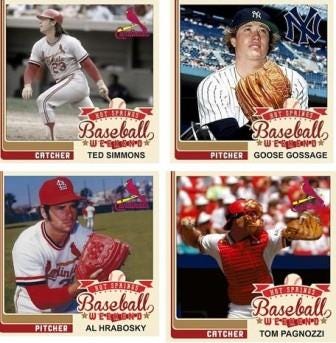
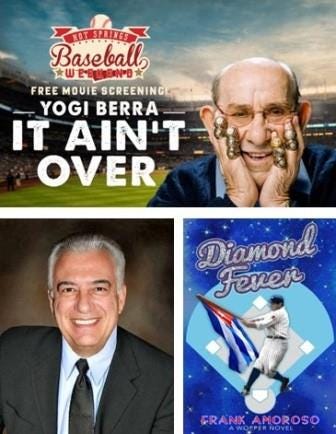


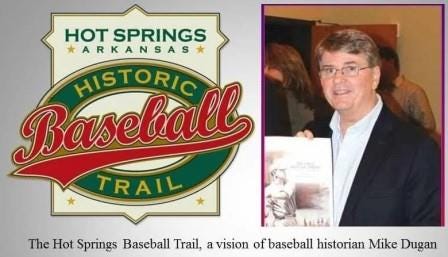
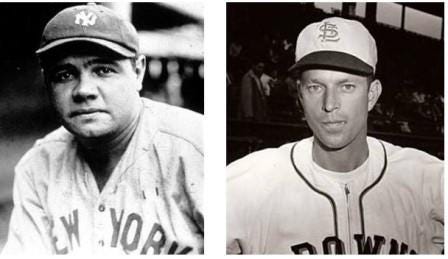
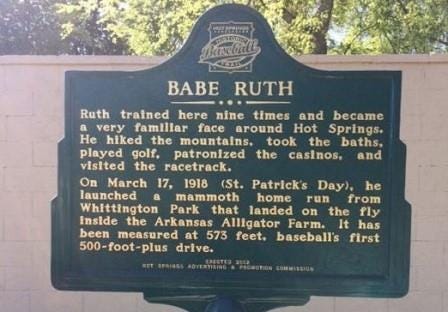

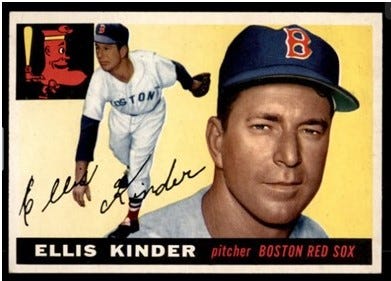
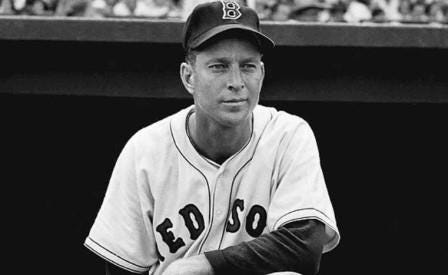
See you Saturday, Jim!